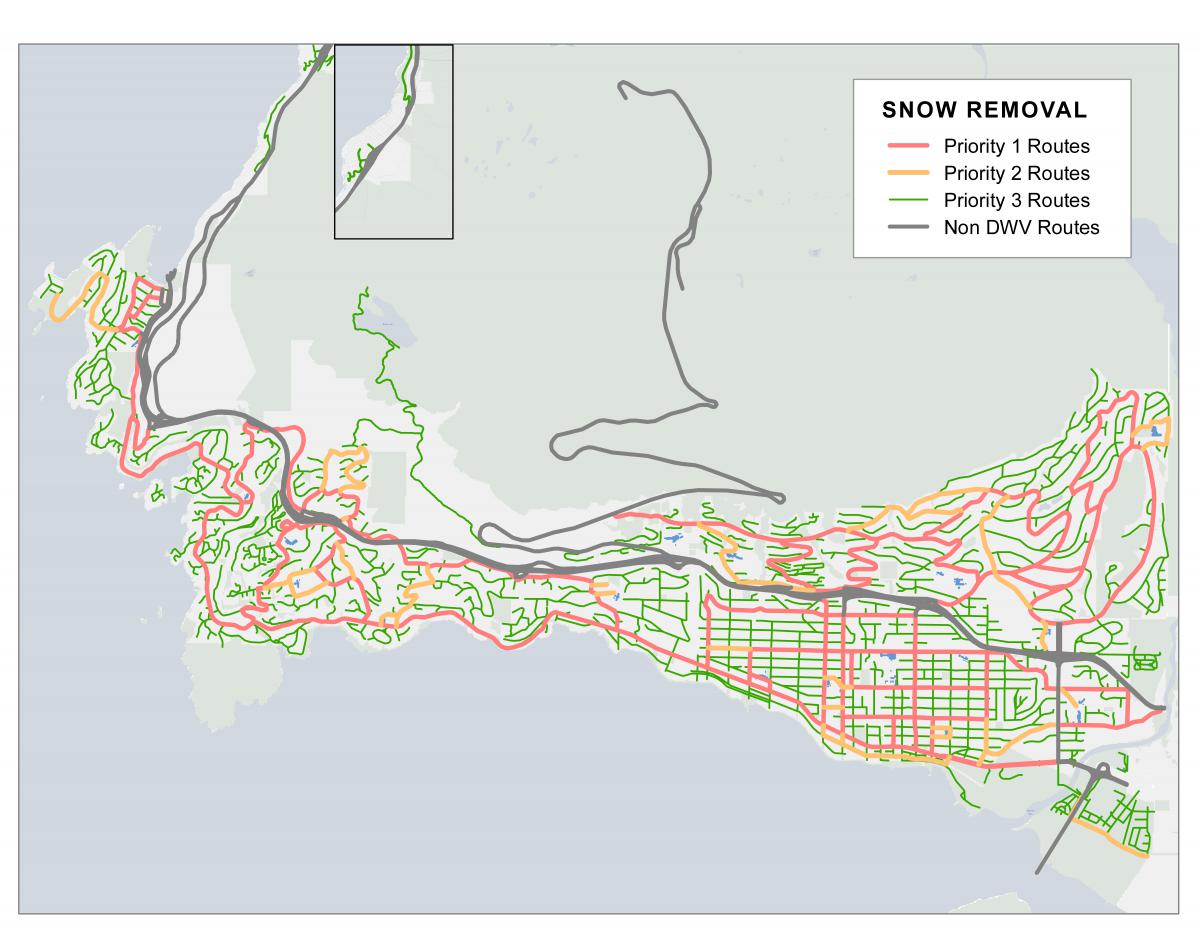Winter is a challenging time of year, but by taking a few common-sense steps, you can help maintain safer roads, sidewalks, and prevent other winter-related risks.
View the tabs below to find out how to be prepared for the challenges that can arise during storms.
West Vancouver's Guide to Snow Clearing
Winter Weather brochure (PDF) – a handy list of emergency contacts and general information on what to expect during a winter weather event.
-
Before it snows
- Make note of the storm drains around your property. Remove leaves and other debris to avoid flooding.
- Park off-street when snow is expected. This will make it easier for snow ploughs and salt trucks to safely clear the street.
- Be prepared with the right supplies. Keep a shovel and supply of salt to de-ice your driveway and sidewalk.
- If you will be unable to clear the sidewalk in front of your property, arrange for a friend or neighbour to help or sign up for a Snow Angel.
After it snows
- Keep the sidewalk in front of your property clear of ice and snow. Property owners must clear the sidewalks around their homes or businesses of snow and ice within 24 hours. See the Traffic and Parking Bylaw for details.
- Check-in on neighbours and family members who may require assistance.
- Clear snow from fire hydrants around your home or business to help our firefighters during an emergency.
- Park your car off the street. You could receive a ticket and be towed if your vehicle blocks any of the following:
- bus stops
- driveways
- fire hydrants
- intersections
- snow removal equipment
- the normal flow of traffic
Snow clearing routes
District staff monitor roads for snow and ice and are always winter-ready. During a snow event, crews are dispatched to remove snow and ice from streets on a priority basis.
- Priority 1 routes: Bus routes, emergency routes, arterial roads (e.g. Marine Drive) and major collector roads (e.g. 15th Street) are the first to be cleared. During longer storms, primary roads—especially bus routes—are repeatedly plowed to ensure that everyone has a viable transportation alternative.
- Priority 2 routes: School routes and minor collector roads (e.g. Bellevue Avenue) are the second to be cleared.
- Priority 3 routes: Local roads, cul-de-sacs, footpaths and footbridges will be dealt with after the weather disturbance has passed and/or Priority 1 and 2 routes are in a safe and stable condition. Please be patient!
West Vancouver's Guide to Snow Clearing

-
Seven steps to stay safe in cold weather
- Listen to the weather forecast and check Environment Canada's website for updates.
- Plan ahead – if you are working outdoors, schedule extra breaks to warm-up or if you are planning recreational activities, reduce the amount of time you will be outdoors.
- Dress warmly – dress in layers that are wind resistant; wear a hat, mittens, and something to cover your face.
- Seek shelter – if the wind chill is significant, get out of the wind and limit the time you spend outdoors. Please note the daytime community warming spaces below.
- Stay dry – wet clothing chills the body rapidly. Remove outer layers of clothing or open your coat if you are sweating.
- Keep active – if you are outdoors and need to warm up, try to increase the speed you are walking.
- Be aware – watch for signs of frostbite and hypothermia. It is important to note that children and the elderly are more susceptible to the cold—check on your relatives and neighbours.
Daytime community warming spacesWest Vancouver Memorial Library, 1950 Marine Drive
Monday–Thursday, 10 a.m.–8 p.m.
Friday–Sunday, 10 a.m.–6 p.m.West Vancouver Community Centre, 2121 Marine Drive
Monday–Friday, 5:30 a.m.–9 p.m.
Saturday, 6 a.m.–9 p.m.
Sunday, 8 a.m.–9 p.m.Gleneagles Community Centre, 6262 Marine Drive
Monday–Thursday, 6 a.m.–9 p.m.
Friday, 6 a.m.–8 p.m.
Saturday and Sunday, 8 a.m.–6 p.m.Seniors' Activity Centre, 695 21st Street
Monday–Thursday, 8:30 a.m.–8 p.m.
Friday–Sunday, 8:30 a.m.–4 p.m.North Vancouver facilities are also available as daytime community warming spaces. View the hours at the links below:
- North Vancouver Recreation and Community Centres
- District of North Vancouver Libraries
- City of North Vancouver Libraries
Weather alerts and resources
-
The following tips will help you and your loved ones stay safe this snow season:
- Install quality snow tires on your vehicle and drive only if necessary. If you need to drive, take extra caution and plan for extra time to reach your destination. Public transit is a good alternative, but expect schedules to be affected by snow.
- Prepare an emergency kit for your home and vehicle, including candles, matches, blankets, a shovel, booster cables, water, and some non-perishable food. Visit North Shore Emergency Management for more information.
- Monitor weather forecasts carefully and plan accordingly.
- Stay on main roads and avoid side streets.
- Drive slowly and be sure to brake early to avoid skidding.
- Especially during periods of heavy rainfall, avoid creeks and rivers. Flash floods are a real possibility and pose a significant danger.
- Stay well clear of downed power lines and report them by calling 9-1-1. Learn more from BC Hydro.
-
Did we miss your pick-up? Your collection schedule may have to be suspended during periods of snow and ice.
If this occurs, notifications will be posted on the WestVanCollect app, on the District’s social media channels, and on the West Vancouver homepage.
If your material is not collected by 7:30 p.m., set it out again the following day. If it is still not collected the following day, set it out on your next scheduled collection day. Always ensure that your material is securely stored overnight to avoid attracting wildlife.
-
Monitor the District website, Twitter and Facebook pages for snowfall warnings and other alerts.
Follow North Shore Emergency Management on Twitter.

